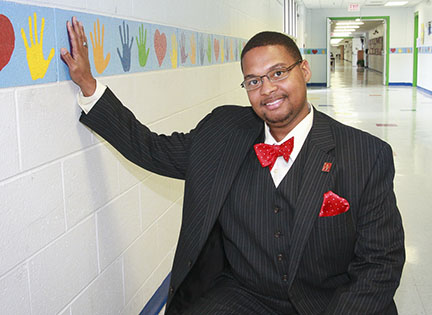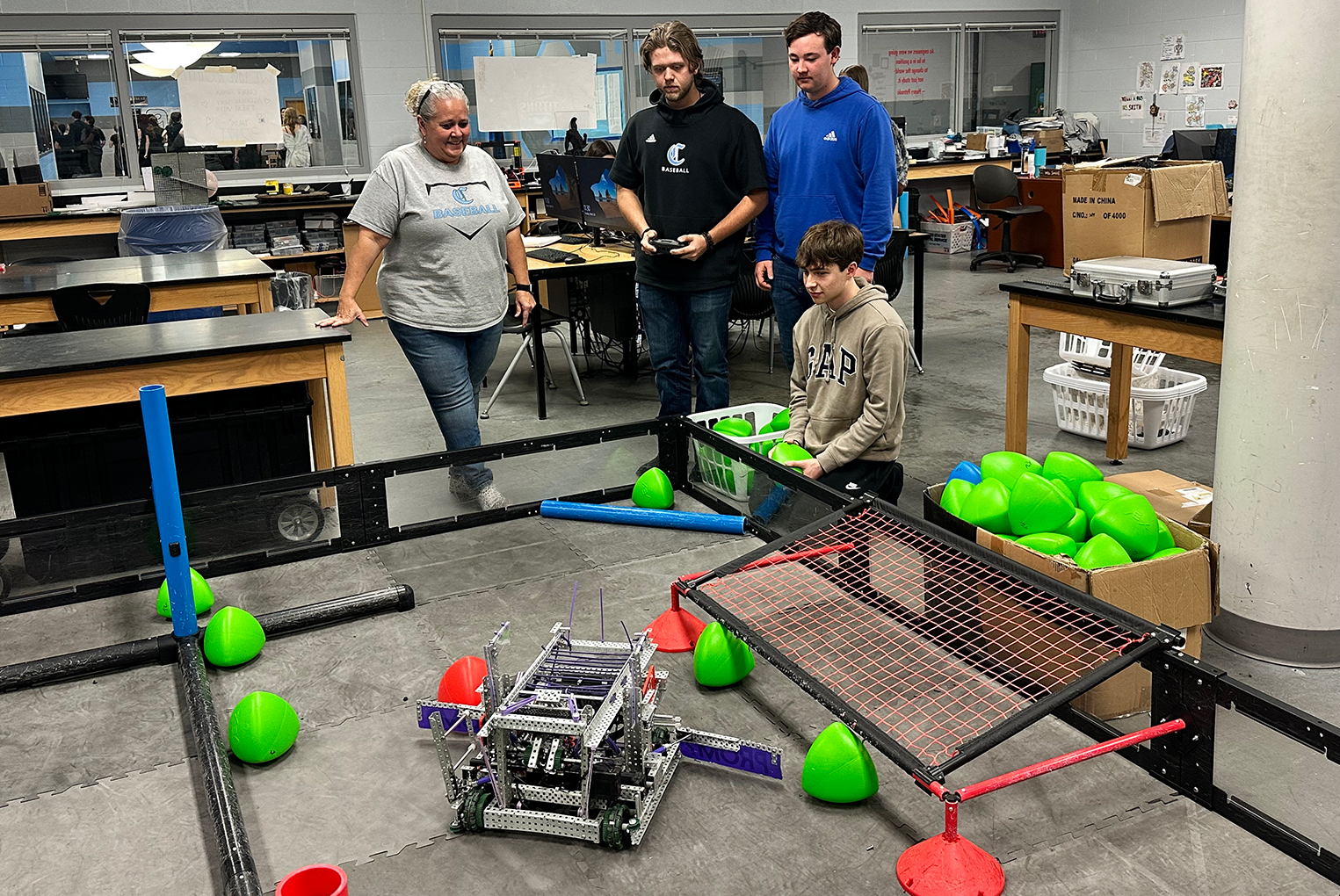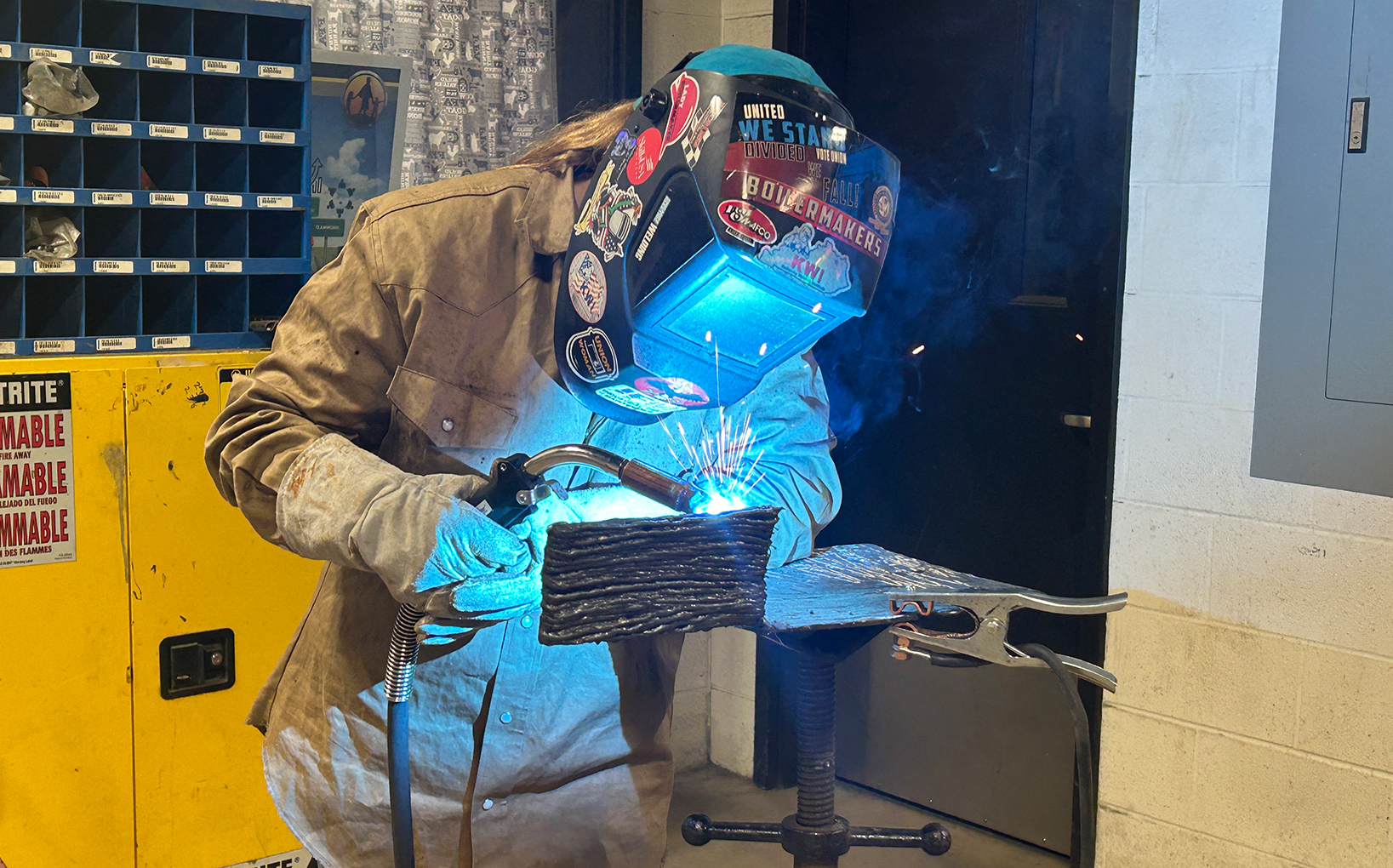
Geco Ross, a teacher at McNabb Elementary School, placed his hand on the wall over the handprint he left there while a student at the Paducah Independent school.
Photo submitted
By Brenna R. Kelly
The way Geco Ross sees it, he’s competing with video games for his 5th-grade students’ minds.
“There are so many other things that are highly impactful and engaging,” said Ross, history teacher at McNabb Elementary School in Paducah. “Then we place students in a classroom and we give them a book and some paper.”
So instead, Ross’ lesson plans sometimes call for fake blood, crime scene tape, a chalk body outline and Smarties.
“I try to make my classroom and my instruction as much like a video game as possible,” said Ross, who is in his 7th year of teaching at Paducah Independent Schools. “I want to keep them engaged the entire time.”
Those creative lessons are part of the reason Ross was named the 2015 Kentucky History Teacher of the Year. The award from the Gilder Lehrman Institute of American History is designed to recognize teachers of American history who demonstrate creativity and imagination and effectively use primary sources to engage students.
Ross was chosen from 56 nominees by a panel of educators put together by the Kentucky Historical Society, which helps administer the award.
In addition to a $1,000 prize, Ross was a finalist for the National History Teacher of the Year award, which recently was won by 5th-grade teacher in South Carolina.
Ross’ colleagues nominated him, despite the loud noises often coming from his room and his lessons that sometimes spill over into the hallways.
“On any given day, students might be participating on a simulation about the Boston Tea Party, singing a song about The Age of Exploration, or creating projects on different Native American cultures,” 5th-grade reading teacher Candace Newbern wrote in her nomination. “He bases his instruction on research-proven methods, settling for nothing less than implementing cutting-edge initiatives.”
Before becoming a social studies teacher, Ross taught 3rd-grade at Morgan Elementary and was a literacy specialist. Then three years ago, he returned to the school where his dream of being a teacher began.
“I’ve only ever wanted to have two professions,” said Ross, who attended McNabb from kindergarten through 6th grade. “When I was very young, I wanted to be a bus driver. Then when I got a little older, I wanted to be a teacher.”
While he was a student, the entire school put handprints on the hallway walls in several colors of paint. Now, almost every day, Ross walks past his purple handprint on the wall between the nurse’s office and the gymnasium.
Ross thought he wanted to teach high school at first, but he changed his mind after working in elementary classrooms.
“I realized I wanted to catch them early before they got behind,” he said.
And he catches students early by keeping them engaged.
“When students come into my room, it’s like ‘whoa, what is all of this stuff?’” he said. Sometimes he’s jumping on top of his desk, other times students have to stand on their desks to yell out an answer.
“I view my history class a lot of time as a content reading class,” said Ross, who has a master’s degree in reading and writing.
Student use primary sources and complex texts to help put themselves in the position of the people who experienced the events that students are learning about.
“With anything that you’re teaching, if the students are not actively engaged with what you are doing it’s difficult for them to really connect to it,” he said.
So when studying the American Revolution, he sets up a crime scene in the hallways and classroom and asks students to figure out what happened during the Boston Massacre.
“Instead of reading about it, we turn in it into CSI,” he said. Students have to collect evidence and determine whether the evidence supports a murder claim, accident or self-defense.
They also get a feel for taxation without representation as a one student, the tax collector, takes their Smarties and gives them to another student, the king.
When students learn about slavery and the causes of the Civil War, Ross has them go outside and pick cotton.
“It’s kind of like an Easter egg hunt; I just put cotton balls all over the place,” he said. “Of course it’s nowhere near what actually picking cotton is like, but for elementary kids, they can understand that people had to actually go out in the field and take it out.”

Geco Ross, a teacher at McNabb Elementary School (Paducah Independent), has been named the 2015 Gilder Lehrman Kentucky History Teacher of the Year.
Photo submitted
Ross said his lessons roughly cover from the “Ice Age to the Internet.”
The year starts with geography and economics lessons, during which Ross individualizes the lesson and helps students answer the question “How did you get in the seat you are sitting in?” he said.
Then he shows them how their lives were affected by American history.
“I tell them that throughout the year, we are going to tell the story of the United States. In that story you’ll find little bits and pieces that will tell you a little bit more about your own personal story,” Ross said.
Part of that journey is learning about segregation and civil rights, which is particularly poignant in a school where nearly 70 percent of students are African-American.
“I’m very transparent with students,” Ross said. “I’m an African-American male in an elementary classroom, so I do tell them there that was a time period where I could not teach half of my students.”
He explains that if was teaching, half of the students would be in a school with only other African-Americans. Students have a hard time understanding why that would be, he said.
To understand and appreciate history, Ross said students need to know the whys – not just the whos, whats and wheres of significant events.
“I answer that question of why a lot and it’s a question that a lot of younger children have in school that often goes unanswered,” he said. “But in a history class, you have to answer the why – otherwise you don’t have relevance.”
The 2016 Kentucky History Teacher of the Year award will be given to a 7th-12th grade teacher. Elementary school teachers will be considered for the 2017 award.
MORE INFO …
Geco Ross Geco.Ross@paducah.kyschools.us



CONGRATULATIONS.